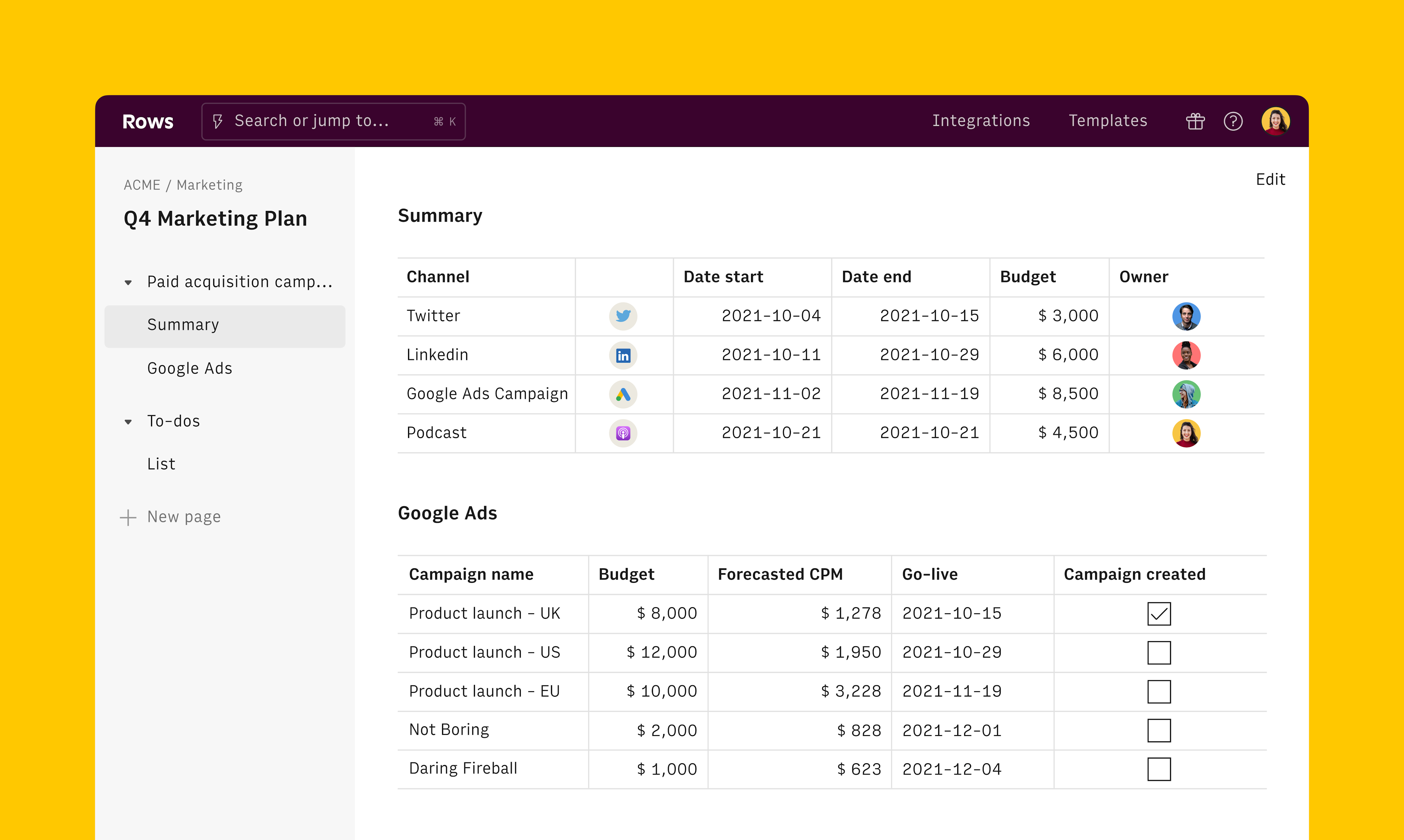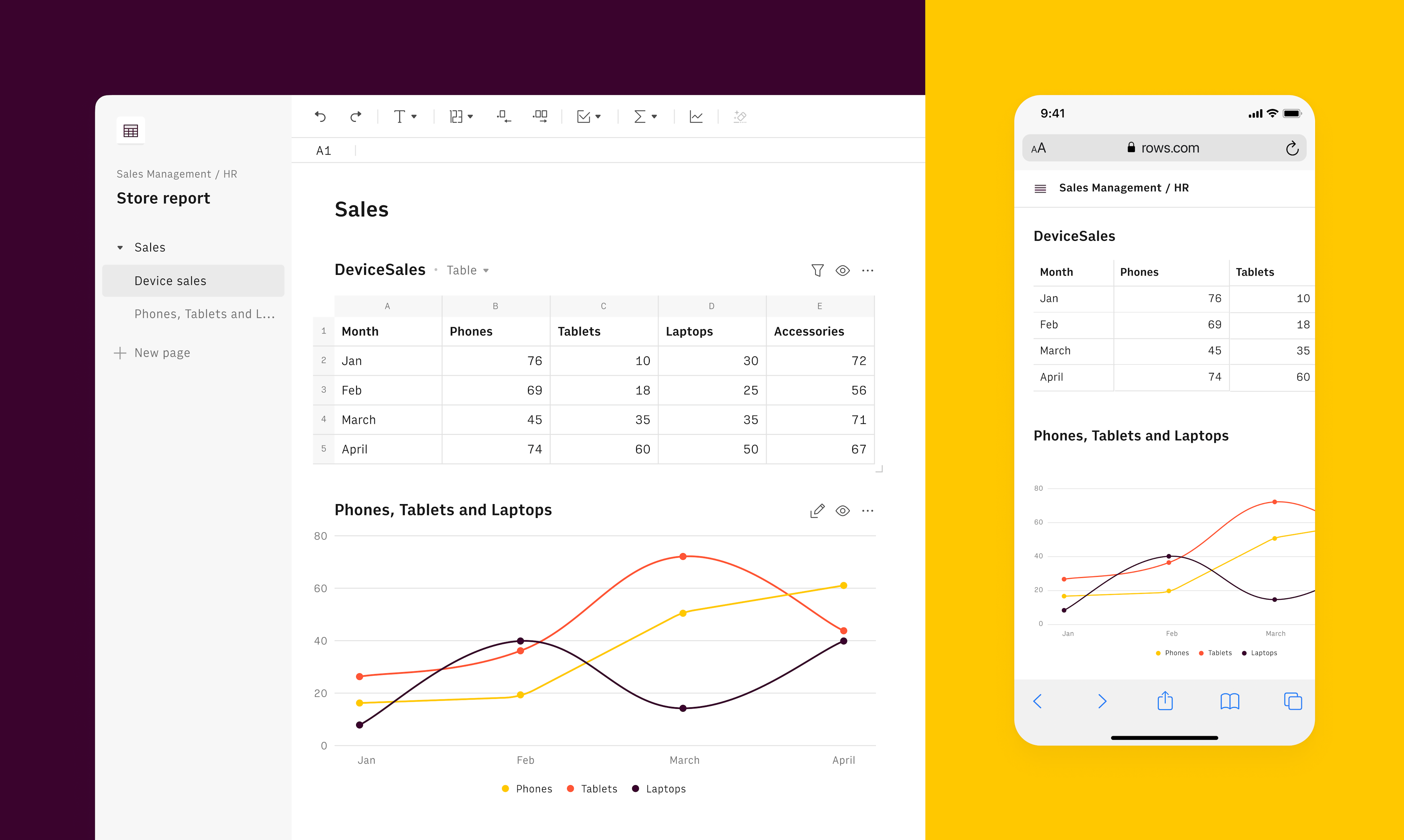They’d spent so many long nights working together — a young, dynamic startup founder and a freshly filled-out spreadsheet. The founder had sobbed and smiled and the spreadsheet was there through it all, with a twinkle in cell I5. It wasn’t romantic, but... it was a strong bond.
This is a loving relationship many startup leaders know well. Humberto Ayres Pereira, founder and chief executive of Rows, a startup working on a next generation spreadsheet, says every startup likely uses a spreadsheet of some form.
“If you’re not using spreadsheets, you really don’t have a canvas,” he says. “Everyone uses notetaking of some form, everyone uses checklists, everyone uses email, everyone uses a calendar and everyone needs to work with data. That’s where spreadsheets come in.”
But how does software that was created in 1978 still hold the key to our hearts? We spoke to experts and founders about how spreadsheets keep their businesses going.
The power of love… and empowering employees
For Pereira, spreadsheets are integral to a business’s success because everyone can use them and they allow people to feel in control of their work.
“I think why people love them is that it’s one of the last pieces of software where people are still in charge,” he says. “If you use all these other tools, you just give your data to something else, you don’t know how it’s processed… with spreadsheets, people feel in control of what they’re doing.”
Pereira says this can be used to empower employees.
If you use all these other tools, you just give your data to something else, you don’t know how it’s processed… with spreadsheets, people feel in control of what they’re doing
“We’ve felt from the beginning that we’re solving a technology and productivity problem as much as a communication and collaboration problem,” he says. “If you put power into the hands of your team and give them tools to better work together, they’ll produce more, and they’ll come up with more experiments which will lead to better results.”

For Paige Zeigler, chief of staff at London-based travel startup Duffel, spreadsheets will always beat fancier software because they’re simple enough that every team member can use them.
“Spreadsheets might seem old school when there are other SaaS products that are prettier or have more bells and whistles, but spreadsheets get the job done,” she says. “It’s a tool everyone in the company already has and can generally navigate — and it just works.”
And they’re also a powerful tool for cross-team collaboration, says Pereira: “A spreadsheet is really where you get to own your thoughts and create things for your teams.”
Matteo Oberto, senior consultant of strategy & growth at Berlin-based logistics unicorn Sennder, tells Sifted he uses spreadsheets to test out ideas between different teams.
Spreadsheet features such as formulas and macros allow us to test our hypotheses with hard data
“Spreadsheet features such as formulas and macros allow us to test our hypotheses with hard data,” he says. “Moreover, simple features such as colour coding and real-time collaborative editing allows us to gather feedback from other teams, which we use to cross-check and validate our hypotheses.”
Building a life together... from product roadmaps to hiring pipelines
According to Pereira, spreadsheets started out as an accounting tool, then grew into a planning tool for business, before moving into product management and marketing. But now startups can use them for anything from social media monitoring to hiring pipelines.
“Now they pretty much do anything,” he says. “The flexibility has been growing a lot and doesn’t show signs of stopping. That’s why at Rows we built the spreadsheet that works as modern teams do — it’s data-rich, collaborative and crazy fast. You can build anything from everyday tasks and lead lists, to automated reports and internal tools”
For Tim Chen, cofounder and CEO of American personal finance company NerdWallet, spreadsheets sparked the idea for his $500m business. He says his sister asked him to help her find a credit card, but he was shocked there wasn’t any neutral information online pulling all the facts together that wasn’t marketing or promotional material.
“After a week of extensive research compiling offers from major banks and credit card companies, I sent my sister an Excel spreadsheet breaking down her options,” he says. “Soon, that spreadsheet was forwarded widely outside of my family and friends. That’s when I realised there was a real shopability problem in financial services where consumers had to sift through banks’ dense materials for information.”
My love for you grows... because you save me time and money
Andreas Jonsson, cofounder and chief executive of LinkedIn analytics app Shield, says spreadsheets can save you crucial time and money in the early days of a startup.
“Spreadsheets are dull but versatile,” he says. “Keeping track of your progress, assumptions, experiments, customers and feedback can all be done using spreadsheets instead of expensive software products.”
But while Jonsson says spreadsheets can become redundant when you’re able to subscribe to niche software products, Pereira disagrees. He says the flexibility of spreadsheets means that they can scale with the growth of companies, something that fancy SaaS tools are less able to do. Pereira says Rows has 50+ built-in data integrations, making it possible to connect the spreadsheets to custom APIs and unique live sharing. This means they can be turned into interactive dashboards, automated reports and web apps.
Love is hard, and spreadsheets have a downside — they can be clunky, slow and overcomplicated, and one tiny mistake can throw the whole sheet off
Sennder, for example, uses spreadsheets to plan for the future and adjust those plans according to different situations.
“Spreadsheets still provide unrivalled flexibility and usability that allows us to create customised bottom-up business plans,” says Oberto. “We can easily calculate and predict profitability, seeing how it changes as revenue increases and costs decrease.”
You’re the one that I want
Love is hard, and spreadsheets have a downside — they can be clunky, slow and overcomplicated, and one tiny mistake can throw the whole sheet off. That’s why it’s important to pick the right tool with the right offering.
When it’s time to settle down, Pereira says next generation spreadsheets such as Rows can help keep the romance alive with features that cater to modern teams.

“If you’re sharing a spreadsheet on Excel or on Google Sheets, they have very obvious limitations and carry a high risk of your spreadsheets being messed up. That’s why we built a revolutionary live sharing feature, so your setup and formulas are always safe,” he says.
“What we offer is the built-in integrations, which let you pull data on companies, people and places from tools and public databases such as LinkedIn, Google Analytics, Crunchbase, Salesforce, Stripe and others directly in your spreadsheet.” This allows users to toggle between editable and public mode, allowing you to control what data others see.
A table with numbers will never be as exciting as a rock concert. But I think what we're trying to do is lift boring work off people’s shoulders and turn this love-hate relationship with spreadsheets into a healthy one
Pereira adds that Rows is built to work on any device, even smartphones. But his goal at the end of the day isn’t to sweep you off your feet, it’s to make you feel supported along your startup journey.
“A table with numbers will never be as exciting as a rock concert,” he says. "But I think what we're trying to do is lift boring work off people’s shoulders and turn this complicated relationship with spreadsheets into a healthy one."
If you are looking to elevate your spreadsheet game, give Rows a try here.



